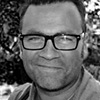-
Spring Feature 2017
-
Feature
-
POETRY
- Susan Berlin
- Laure-Anne Bosselaar
- Elena Karina Byrne
- Billy Collins
- Miles Coon
- Shawn Delgado
- Travis Denton
- Stuart Dischell
- Kim Dower
- Stephen Dunn
- Robert Fanning
- Susan Guma
- Naomi Jaffa
- Kenneth Knoespel
- Gerry LaFemina
- James Langford
- Michael Laskey
- Seth Michelson
- Andrew Motion
- Dean Parkin
- Michael Ryan
- Vivek Sharma
- John Skoyles
- Marc Straus
-
ESSAY
Feature > Poetry
Remembrance of Tom Lux
An Horation Notion
who rolls the log beneath the block, then another,
then pushes the block, then pulls a log
from the rear back to the front
again and then again it goes beneath the block,
and so on. It's how a thing gets made—not
because you're sensitive, or you get genetic-lucky,
or God says: Here's a nice family
seven children, let's see: this one in charge
of the village dunghill, these two die of buboes, this one
Kierkegaard, this one a drooling
nincompoop, this one clerk, this one cooper.
You need to love the thing you do—birdhouse building,
painting tulips exclusively, whatever—and then
you do it
so consciously driven
by your unconscious
that the thing becomes a wedge
that splits a stone and between the halves
the wedge then grows, i.e., the thing
is solid but with a soul,
a life of its own. Inspiration, the donnee,
the gift, the bolt of fire
down the arm that makes the art?
Grow up! Give me, please, a break!!
You make the thing because you love the thing
and you love the thing because someone else loved it
enough to make you love it.
And with that your heart like a tent peg pounded
toward the earth's core.
And with that your heart on a beam burns
through the ionosphere.
And with that you go to work.
Falling Through the Leaves
like the hair of the mad: it's a day, a page
ripped from a book of childhood—yours, any child's,
it's a moment when all is clear, changed.
And it is always on a day of chill and rain, a fierce
gray frame to everything. A stained huddle of cows
bellows in the barnyard: Let us in, their eyes pierced
by pain, dumbness. And the child watches. How
do these moments, these fractures in time
happen, how is a child taken, struck
by something...something, taken low or high,
filled with world or forever with self? Is it luck,
good or bad? One child hears a falling through the leaves,
branches, and does not care what it is,
another hears and knows a bird falls, and grieves
without knowing why or at what cost. This
one is the winter child, the one so filled with world.
The other, no better, no less (neither has a choice),
through life is obliviously hurled.
You hear him talking but it doesn't seem like a voice.
The wind rips across the damp and freezing pastures,
children fill the schoolyards, the shattered towns,
and the stars expel their light—last year's,
last millenium's, their gelid light drilling down.
"An Horation Notion" from Split Horizon, Houghton Mifflin Company, 1994
"Falling through the Leaves" from The Drowned River, Houghton Mifflin Company, 1990



